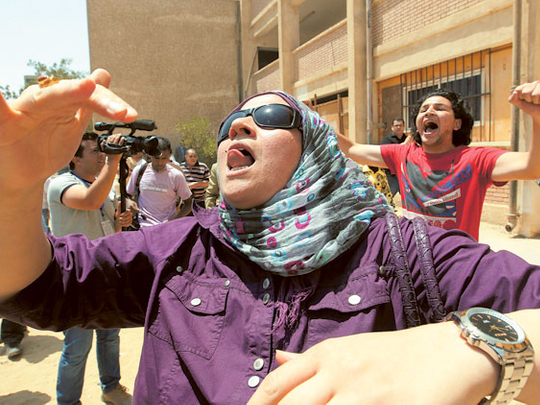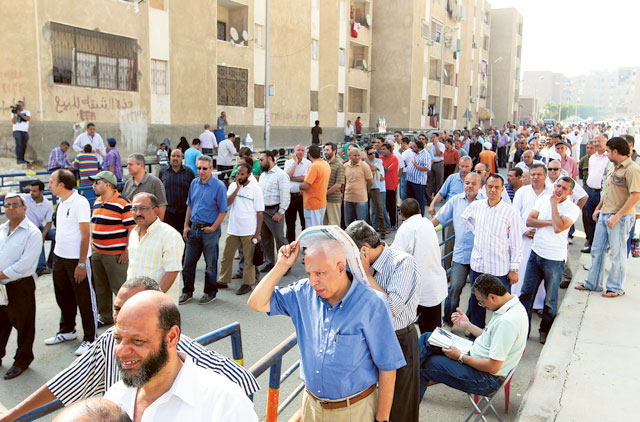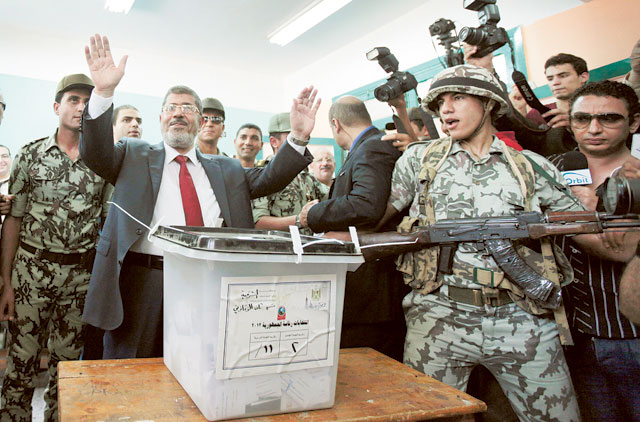
Cairo: Egyptians on Saturday started voting in a two-day balloting to choose their president from between a conservative Islamist and a former premier from the era of the deposed leader Hosni Mubarak.
Voters stood in queues in some polling stations in Cairo to cast their ballots in the first presidential elections since a popular revolt removed Mubarak from power in February last year.
Ahmad Shafiq, Mubarak’s last premier, and the Muslim Brotherhood’s Mohammad Mursi are fighting for the top post amid increasing calls for boycotting.
“Shafiq should be the last one to become Egypt’s president,” said Ahmad, a bearded engineer, as he waited to vote in a polling station in the Cairo suburban area of Al Tajmu Al Khamis. “The former general [Shafiq] is an extension of Mubarak. How can we remove Mubarak and then install his disciple in his place?”
Shafiq, 70, later showed up at this polling station set up at a school to vote amid heavy security from the army and the police. He was quickly allowed to enter through a side school amid jeers from his opponents. “Down with the felul,” they shouted, using a derogatory term against remnants from the Mubarak regime.
Shafiq, who was mobbed by an angry crowd in the same place in last month’s first round, made no comments as his supporters cheered him, saying: “The people want Shafiq a president.”
“He is a strong, veteran statesman,” said a pro-Shafiq voter. “He is the man Egypt needs at this hard time,” added the voter, who gave his name as Ebrahim.
Shafiq had served as an aviation minister for nine years before Mubarak appointed him as a prime minister during the revolt that eventually toppled him.
Egypt’s highest court Thursday ruled that Shafiq, 70, is legal to stand, after it dismissed as unconstitutional a law passed by the Islamist-dominated parliament barring Mubarak-era officials from running for public office. The same court invalided the parliament, a ruling that infuriated Islamists and prompted them to pledge massive support for Mursi.
After voting in his Delta hometown of Sharqia, Mursi, an engineering professor, said that Egyptians would not allow “Mubarak’s holdovers to return.”
Mursi, 61, has portrayed himself as a representative of the anti-Mubarak revolt and his rival as a symbol of the former regime. Some groups, who led the uprising against Mubarak, have pledged support for Mursi, to head off what they call the “return of the old regime”.
Shafiq, meanwhile, has called himself an advocate of a secular state, casting his opponent as a symbol of a theology.
The Christian minority are expected to mainly vote for Shafiq as they are worried about an Islamist state in Egypt. They account for around 10 per cent of the nation’s 82 million and have long complained about prejudice from the Muslim majority.
More than 4,000 military and security forces were Saturday deployed outside polling stations across Egypt. Army helicopters were seen flying over Cairo.
The military rulers have vowed to stand firm against attempts to disrupt the election or make violations. No incidents of serious violence or irregularities were reported.
A group, calling itself “We are Boycotting”, Saturday urged its followers to gather in major squares across Egypt during the two days of balloting to show their strength. “Boycott is a lobbying bloc, reflecting nonrecognition of the legality of this election,” the group said in a statement.













